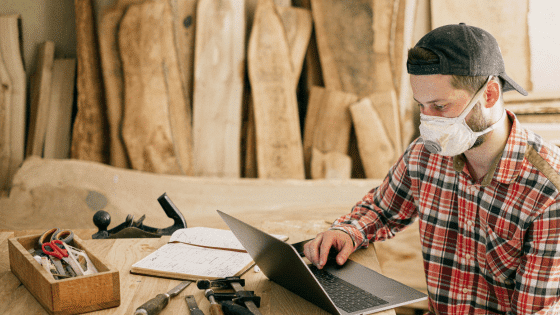Table of Contents
Last Updated on December 25, 2024 by John Patterson
There’s no feeling quite like building your very own DIY project.
Whether you’re embarking on a large-scale extension or just building a new piece of furniture, knowing that you constructed whatever you’ve made yourself is a feeling that’s difficult to match.
Naturally, though, that’s assuming that everything goes according to plan, which can be difficult; there’s a ton of stuff that can go wrong when you’re putting together a complex DIY endeavour, and just like the highs of completing the project, the lows of failure can be challenging to match.

Here are 9 things you’ll need before you start your next DIY project.
#1. A clear plan
It’s not a good idea to embark on any DIY project if you don’t have a plan in place.
It doesn’t matter how large or small the scope of the project is; having a plan will mean you know what you’re doing every step of the way, and you shouldn’t fall prey to easy pitfalls and potholes while you’re in the process of building or assembling your project.
Create a clear plan first and label each step so you know where you should be along every step.
#2. Funding
Unfortunately, no DIY project is free. You’re always going to need at least some funding when you’re embarking on a DIY journey.
This is especially true of larger-scale projects like building a house extension or renovating a room. Luckily, there are lots of funding avenues available to you.
This would be an excellent time to dip into savings, for instance, or you could pursue another option, like a £2500 loan from a reputable online provider, thus pushing you over the edge and giving you enough money to realise your dream.
#3. Materials
Trust us when we say that more DIY projects than we’d care to admit have fallen by the wayside due to inadequate materials.
Make sure you have everything you’ll need before you start with whatever you’re making. The last thing you want is to realise that you’re missing a single screw or bolt that would have completed your project.
It’s a good idea to make an itemised list of everything you’ll need, then make sure you’ve acquired all of it – with no exceptions – before starting.
#4. Support
Are there friends or family members you feel would be particularly well-suited to helping you out with a DIY project? If so, you should talk to them and ask if they’d be willing to help.
Undertaking a DIY project on your own – especially if it’s a big one – can be daunting; if something goes wrong, you may not have a safety net to fall back on.
You could even offer to reimburse friends and family members for their time!
#5. Tools
Just like you’ll need suitable materials for a DIY job, you’ll also need the appropriate tools.
There are several tools that nobody should be without for any kind of project, including hammers, screwdrivers, and drills, so you shouldn’t start your project until you have the basics.
You should also acquire any special tools you’ll need, which you should hopefully have planned out as part of your project plan (which we discussed earlier!).
#6. Permission
Depending on the size and scope of your DIY plan, you may or may not need special permission to carry it out.
Not only is it not a good idea to embark on your project without obtaining this permission, but it might be illegal, so ensure you have the proper permits to proceed.
After all, you don’t want your dream project to be scuppered because you forgot to file the proper form or talk to the correct official, especially after you’ve spent so long planning it!
#7. Time
No matter what DIY project you’re embarking on, you’ll almost always need more time than you initially planned.
Try to come up with a reasonable estimate of how long your project will take. Don’t be afraid to enlist the help of friends or family members to give you their estimates so you can take an average if necessary.
Once you’ve got a figure, add a generous helping of time on either side to account for mistakes or setbacks. Nothing causes panic more than trying to stick to a super-tight schedule.
#8. Realistic expectations
We know that every DIY project begins as a twinkle in the eye of its originator, but you need realistic expectations for your project.
Renovating an entire house from top to bottom, for instance, is extremely difficult, and it can quickly and easily overwhelm even the most experienced DIY enthusiasts.
As part of your plan, you should have a realistic understanding of what your project will entail and whether or not you will be able to achieve your goals.
#9. Determination
Even though it’s essential to have realistic expectations, you should also proceed with determination.
Keep working hard on your DIY project to see it through to fruition. When something goes wrong (and it often does!), determination sets you apart from those who have abandoned their projects.
When you’ve overcome your hurdle and finished whatever you’re doing, it’ll be worth it, as you’ll be able to say that you faced down your challenges and beat them.

